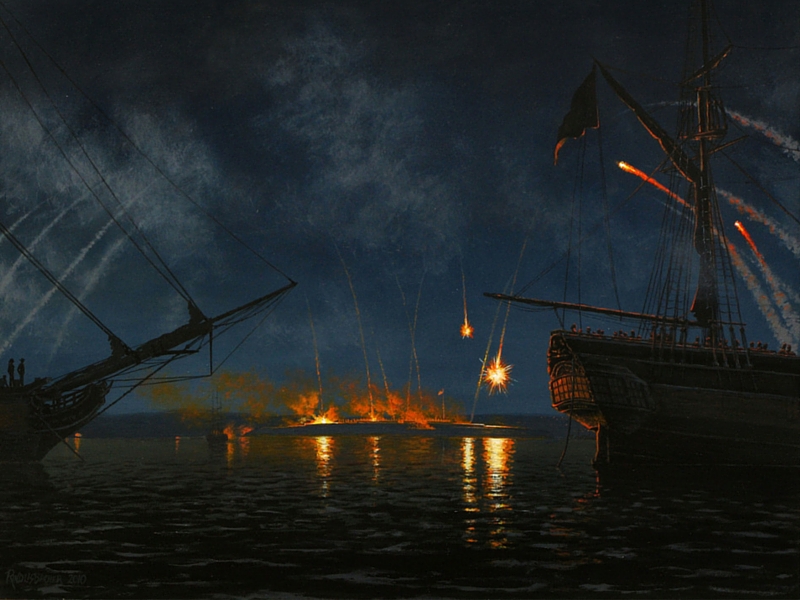I love the 4th of July. Even when considered in the ever-dimming light of history, it captures much of what has been exceptional about the United States. This morning at church we celebrated and honored, as we always do, those who have served this country in the cause of freedom and liberty. Part of that celebration involved singing the first and fourth verses of The Star Spangled Banner.
Most Americans are very familiar with the first verse; so much so that we tend accept it as the entirety of our National Anthem. It’s included in the opening of most sporting events and other public gatherings. It’s hard to sing. It has been know to cause red and watering eyes. It was written by Francis Scott Key after a battle with the British. There’s more.
The War of 1812 was a critical time in America’s history. The Commander of Fort McHenry in Baltimore, Colonel Armistead, along with other military leaders, knew the fort had important strategic, and symbolic, value. The British had burned Washington and were advancing toward Baltimore. Fort McHenry was in their way. Baltimoreans were discouraged, afraid and in great need of something to lift their spirits and their hopes. An act of defiance might help.
In 1813, Armistead commissioned Mary Youngs Pickersgill, a local seamstress and flag maker to make two flags for Fort McHenry – a large flag and a smaller one to fly in bad weather. The large flag was 30 x 42 feet, so it could be seen from a great distance; plainly visible to the English Fleet.
This flag flew above Fort McHenry during the British siege of the fort during 1814. Francis Scott Key, an attorney on board a British vessel to negotiate a prisoner exchange, was caught there during the battle. In the early morning of September 14, 1814, Key saw the stars and stripes from a ship several miles down the Patapsco River, still waving in the breeze after twenty-five hours of heavy bombardment by the British. The siege was broken, Fort McHenry held. The British were discouraged (and withdrew); Baltimoreans and other Americans were encouraged (and fought on, renewed), and Key was inspired to write the poem that became our National Anthem.
There’s always more. And over-familiarity keeps us from seeing it. Over-familiarity drains the emotional significance from events and information. It breeds indifference and creates a false sense of knowing. And lastly, it keeps us from succeeding in seeing and sharing meaning (our own opinions, feelings, theories, and experiences about a subject, event or idea). The idea is to increase shared meaning; it’s how we get useful insights, practical lessons and better decisions. Much of what I do with and for my clients is to help them discover more, or “what’s going on behind what’s going on.” And where does “more” live? Beyond the first verse.
Stay curious my friends!
In Other Words…
Oh, say can you see by the dawn’s early light
What so proudly we hailed at the twilight’s last gleaming?
Whose broad stripes and bright stars thru the perilous fight,
O’er the ramparts we watched were so gallantly streaming?
And the rocket’s red glare, the bombs bursting in air,
Gave proof through the night that our flag was still there.
Oh, say does that star-spangled banner yet wave
O’er the land of the free and the home of the brave?
On the shore, dimly seen through the mists of the deep,
Where the foe’s haughty host in dread silence reposes,
What is that which the breeze, o’er the towering steep,
As it fitfully blows, half conceals, half discloses?
Now it catches the gleam of the morning’s first beam,
In full glory reflected now shines in the stream:
‘Tis the star-spangled banner! Oh long may it wave
O’er the land of the free and the home of the brave!
And where is that band who so vauntingly swore
That the havoc of war and the battle’s confusion,
A home and a country should leave us no more!
Their blood has washed out their foul footsteps’ pollution.
No refuge could save the hireling and slave
From the terror of flight, or the gloom of the grave:
And the star-spangled banner in triumph doth wave
O’er the land of the free and the home of the brave!
Oh! thus be it ever, when freemen shall stand
Between their loved home and the war’s desolation!
Blest with victory and peace, may the heav’n rescued land
Praise the Power that hath made and preserved us a nation.
Then conquer we must, when our cause it is just,
And this be our motto: “In God is our trust.”
And the star-spangled banner in triumph shall wave
O’er the land of the free and the home of the brave!
– Francis Scott Key, 1814, The Star Spangled Banner
“Our human race is affected with a chronic underestimation of the possibility of the future straying from the course initially envisioned.” – Nassim Nicholas Taleb
“The important thing is not to stop questioning. Curiosity has its own reason for existing. One cannot help but be in awe when he contemplates the mysteries of eternity, of life, of the marvelous structure of reality. It is enough if one tries merely to comprehend a little of this mystery each day. Never lose a holy curiosity.” – Albert Einstein
“Familiarity is a magician that is cruel to beauty but kind to ugliness.” – Marie Louise De La Ramee
“Our prototype for occupational fervor is the Catholic tailor who used his small savings of many years to finance a pilgrimage to the Vatican. When he returned, his parish held a special meeting to get his first-hand account of the Pope. ‘Tell us,’ said the eager faithful, ‘just what sort of fellow is he?’ Our hero wasted no words. ‘He’s a forty-four medium.'” – Warren Buffett
“The answers you get depend upon the questions you ask.” – Thomas Kuhn
“But do not despise the lore that has come down from distant years; for oft it may chance that old wives keep in memory word of things that once were needful for the wise to know.” – J.R.R. Tolkien
In The Word…
How much better to get wisdom than gold! And to get understanding is to be chosen rather than silver. -Proverbs 16:16
In Linked Words…
Harvard Business School
Scanning for Threats & Opportunities by George S. Day & Paul J.H. Schoemaker
Knowledge@Wharton
Vigilant vs. Operational Leaders






